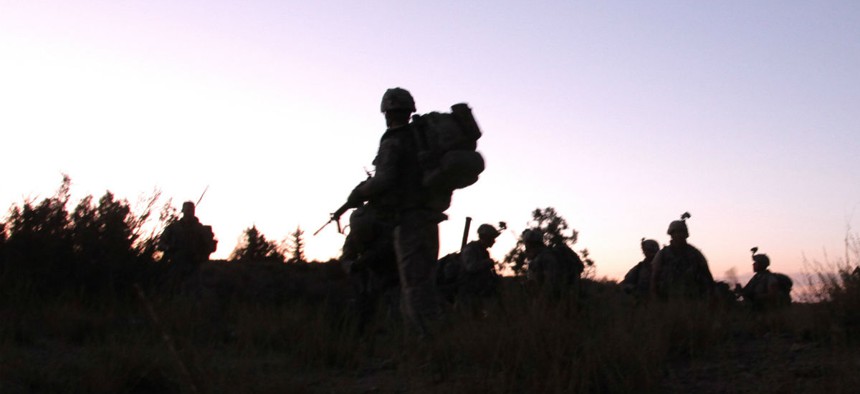
Staff Sgt. Andrew Smith/Defense Department file photo
Obama Says Military Retirement Reforms Will Require More Study
The administration is ready to move forward immediately on a number of other January recommendations from compensation commission.
President Obama on Thursday informed lawmakers that his administration is ready to act on 10 of 15 recommendations by a commission on military pay and benefits, but that others -- including a proposal to drastically overhaul the military retirement system – will require more study.
The Military Compensation and Retirement Modernization Commission in January recommended scrapping the armed services’ current 20-year cliff vesting retirement system and replacing it with a blended program composed of a defined benefit and greater participation in the government’s 401(k)-style Thrift Savings Plan. Obama said this and proposals on reserve component duty statuses, support for exceptional family members with special needs, and commissary and exchange consolidation would require further review.
The president pledged to continue working with the commission to “understand how the … proposals would affect the all-volunteer force.” He said he would notify Congress of progress.
Meanwhile the House Armed Services Committee took matters into its own hands on Wednesday, reporting out a bill that would automatically enroll new troops into the TSP at 3 percent of their pay, with a 1 percent match from the government.
Under the panel’s version of the fiscal 2016 Defense Authorization Act, service members would be fully vested in their retirement plans after two years of service. To encourage members to stay in the military, the measure includes a commission proposal to provide “continuation pay” after 12 years of service. Under the bill, service members who stay in the military for 20 years, and are thereby entitled to a retirement pension, would receive a less generous calculation for their annuity.
The blended retirement system in the authorization bill would take effect in October 2017 and would only apply to new troops. Lawmakers debated whether more study was necessary, but proponents argued there was no sense in further delaying the changes. “There’s always going to be an excuse for delay, and we’ve been hearing that for years. I think this is the time to act,” said Armed Services Chairman Rep. Mac Thornberry, R-Texas.
While the team Obama assigned to analyze the compensation commission’s recommendations did not agree with moving ahead on the retirement proposals immediately, there were a number of other areas where it did support fast action, including improved collaboration between the Defense and Veterans Affairs departments; better educating service members on managing their personal finances; and improving access to child care on military bases.
Obama’s letter said the Defense Department was already working on some of the reforms flagged for immediate action, and would submit legislative proposals to Congress as necessary. He urged Congress to enact that legislation “without delay.”
The compensation commission also made recommendations related to health care, including replacing TRICARE, the military’s health care system, with a “selection of commercial insurance plans” for family members, reserves and retirees not enrolled in TRICARE for Life. Active duty service members would remain in the current health care system.
Obama said in his letter that he agreed on the need for improvements to the military health care system, but believed the proposals in his fiscal 2016 budget were a “good first step and offer service members, retirees and their families more control and choice over their health care decisions.” Obama’s budget called for replacing TRICARE by Jan. 1, 2017, with a “consolidated health plan that incorporates cost-sharing for certain members.”
Obama said his administration would work with the compensation commission and interested lawmakers to develop other proposals for his fiscal 2017 budget.
“The choices we face about military compensation are both vexing and critically important,” Defense Secretary Ash Carter said in a statement Thursday. “DoD will continue to work closely with the Congress and the commission to achieve the goals we share: ensuring the long-term strength and vitality of our all-volunteer force, and honoring all our service members -- past, present, and future.”







